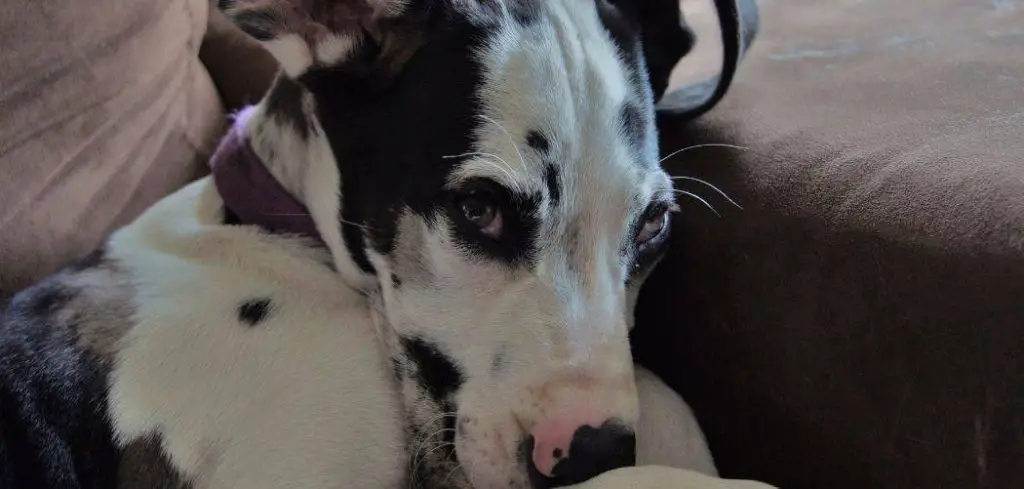Diarrhea and vomiting yellow fluid in an old dog can be alarming and often signals something more than just a simple stomach upset.
These symptoms may point to digestive issues, infections, or even serious organ-related conditions that need prompt attention.
We outline the common causes of diarrhea and vomiting yellow fluid in old dogs, what you can do at home, and when to seek veterinary help.
Old Dog Diarrhea and Vomiting Yellow — Why It Happens
When an old dog has diarrhea and vomits yellow fluid, it often indicates irritation of the digestive tract, bile reflux, or systemic illness. Causes can range from dietary indiscretion and infections to pancreatitis, liver disease, or kidney problems.
Because senior dogs are more vulnerable to dehydration and complications, these symptoms should never be ignored. Early recognition of the underlying cause can help protect your dog’s comfort and long-term health.

Old Dog Diarrhea and Vomiting Yellow Fluid: Common Causes
Bile Reflux
Bile reflux occurs when bile from the small intestine flows into the stomach, irritating its lining. In older dogs, the stomach may empty more slowly, allowing bile to build up and be vomited.
The fluid is often yellow or greenish, and it may occur on an empty stomach. Diarrhea can develop alongside this irritation, leaving the dog weak and uncomfortable.
Chronic bile vomiting can cause damage to the stomach lining and should be evaluated by a vet.
Read more: Old Dog Diarrhea and Vomiting (What it means)
Gastrointestinal Infections
Bacterial or viral infections can cause both diarrhea and vomiting of yellow fluid in old dogs. These infections inflame the stomach and intestines, leading to rapid fluid loss.
Signs may include fever, lethargy, lack of appetite, and foul-smelling diarrhea. Infections spread quickly in senior dogs, who may not recover as easily as younger dogs.
Prompt diagnosis and treatment with fluids, antibiotics, or supportive care may be required.
Pancreatitis
Pancreatitis is inflammation of the pancreas, often triggered by fatty foods. It disrupts digestion and can cause severe abdominal pain.
Old dogs with pancreatitis may vomit yellow bile and develop watery or greasy diarrhea. They may also appear hunched, restless, or reluctant to eat.
Because pancreatitis can progress rapidly and cause systemic illness, it is a veterinary emergency.
Liver Disease
The liver plays a critical role in digestion and detoxification. In older dogs, conditions such as liver failure, tumors, or cirrhosis can cause digestive disturbances.
A dog with liver disease may vomit yellow fluid due to bile imbalance and develop diarrhea from poor nutrient processing. Other signs include jaundice (yellowing of the eyes or gums), weight loss, and increased thirst.
Liver disease requires veterinary care, as untreated cases can quickly become life-threatening.
Kidney Disease
Kidney failure is common in aging dogs and often affects digestion. Toxins that the kidneys fail to filter can irritate the stomach and intestines, leading to vomiting and diarrhea.
The vomit may appear yellow if bile is involved, while diarrhea can be watery and persistent. Dogs may also drink excessively, urinate more frequently, or appear lethargic.
Kidney disease is progressive, but early treatment can slow its advance and keep your old dog comfortable.
Ingesting Toxins or Foreign Objects
Old dogs may accidentally ingest spoiled food, toxic plants, or even small foreign objects. These irritants can cause both diarrhea and yellow vomiting as the body attempts to expel them.
Signs include sudden onset of symptoms, drooling, restlessness, or abdominal discomfort. Depending on the substance, this situation can be extremely dangerous.
Immediate veterinary evaluation is essential if you suspect poisoning or obstruction.
What to Do If Your Old Dog Has Diarrhea and Vomiting Yellow Vomit
If your old dog is otherwise alert and symptoms are mild, you can provide supportive care at home while monitoring closely.
Offer small amounts of water frequently to prevent dehydration, but avoid allowing your dog to drink large gulps that may trigger more vomiting.
Feed a bland diet of boiled chicken and rice in small portions once the vomiting subsides for several hours. This helps rest the digestive tract.
Ensure your dog has a calm, stress-free environment with easy access to rest areas. Stress can worsen digestive symptoms in seniors.
If diarrhea and yellow vomiting persist beyond 24 hours or your dog appears unwell, veterinary care is essential to prevent complications.
When to Call or Visit Your Vet
Seek immediate veterinary help if your old dog has severe or ongoing vomiting and diarrhea, as dehydration can develop quickly.
Contact your vet right away if the vomit or diarrhea contains blood, or if the yellow vomit is accompanied by weakness, trembling, or collapse.
Other warning signs include refusal to eat or drink, significant lethargy, abdominal pain, or a distended belly.
If your old dog has an existing condition such as kidney disease, diabetes, or liver problems, diarrhea and vomiting should never be managed at home without professional guidance.
Related: Old Dog Diarrhea (Causes and when to worry)
Key Takeaway
Diarrhea and vomiting yellow fluid in an old dog can be caused by bile reflux, infections, pancreatitis, liver disease, kidney problems, or ingestion of toxins.
While mild cases may resolve with rest and bland food, senior dogs are at high risk for dehydration and complications. Providing supportive care at home is helpful, but persistent or severe cases always require veterinary attention.
By acting quickly and working with your vet, you can help your old dog recover and stay as comfortable as possible in their golden years.
